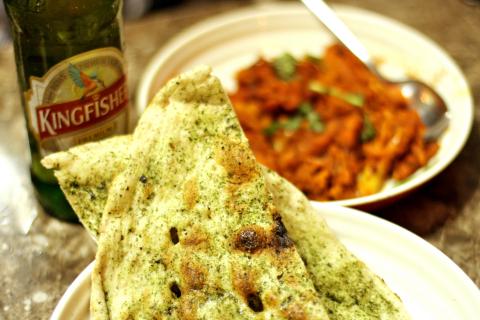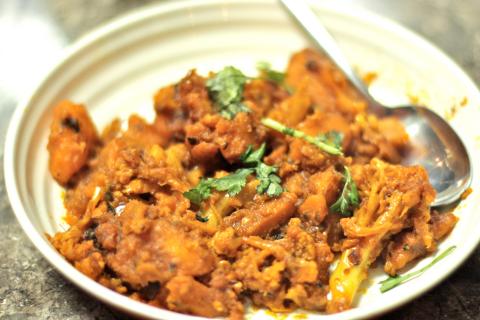Though it is located within sight of Taipei City Hall, Mayur Indian Kitchen is easy to miss because the small takeaway restaurant is tucked among a row of motorcycle repair shops and food stands behind the Keelung Road underpass. Mayur Indian Kitchen is just a kitchen counter with a few tables lined up on the sidewalk, but it offers a wide, constantly changing assortment of home-style Indian cooking. (A second location is located in New Taipei City’s St Ignatius Plaza (徐匯廣場) shopping mall).
Owner Mayur Srivastava worked as a hotel chef before opening Mayur Indian Kitchen six months ago. The eatery’s dishes are freshly prepared and feature whole spices instead of powdered versions. The restaurant specializes in north Indian cuisine, but also offers south Indian classics like dosa, or savory pancakes made from rice flour and lentils served with a variety of stuffings, and crispy samosas. The restaurant frequently changes its menus and offers specials depending on the season. For example, next week Mayur will began serving homemade yogurt, mango and lemon drinks for the warm weather.
“We keep changing our menu because we want to let people taste new things every time. There are so many dishes in India,” says Srivastava.

Photo: Catherine Shu, Taipei Times
The curries I ate at Mayur Indian Kitchen are mildly spicy, but can be made more piquant based on customer requests. The restaurant offers several jain, or vegetarian dishes, such as aloo gobhi (NT$110), which is made with sauteed potato, cauliflower, tomato and spices. I liked how the cauliflower was lightly cooked to retain some of its crunch. The tandoori chicken masala (NT$145) was also good, though most of the chicken was still on the bone and it became tiresome picking off the meat. My favorite dish of the night was the chana masala (NT$95), which paired very well with the butter naan (NT$55). Mayur Indian Kitchen’s freshly prepared version of the Indian flatbread is especially good: the edges are baked until crisp, while the middle is moist and chewy — just right for scooping up curry. The naan comes in 14 savory or sweet flavors. My companion and I also ordered the garlic version (NT$55), which was topped with a plentiful sprinkling of seaweed flakes. The flavor combination was fine but unexpected. We preferred how the plain butter naan tasted with our other dishes.
On a separate visit, I ordered a vegetarian lunch set with chickpea curry, which was made with a liberal helping of cumin. Even the simple cabbage salad included with the set was sprinkled with plenty of fennel seeds, which offered an interesting contrast to the tart vinegar dressing and was a cool palate cleanser after the rich curry and rice.
For dessert, Mayur Indian Kitchen offers both gulab jamun (deep-fried milk balls served in sugar syrup, NT$80) and gajar halwa (NT$95), which we ordered. The deliciously thick, sticky pudding-like dish is made with carrots and cashew nuts cooked in milk and made my sweet tooth very happy.

Photo: Catherine Shu, Taipei Times

In the March 9 edition of the Taipei Times a piece by Ninon Godefroy ran with the headine “The quiet, gentle rhythm of Taiwan.” It started with the line “Taiwan is a small, humble place. There is no Eiffel Tower, no pyramids — no singular attraction that draws the world’s attention.” I laughed out loud at that. This was out of no disrespect for the author or the piece, which made some interesting analogies and good points about how both Din Tai Fung’s and Taiwan Semiconductor Manufacturing Co’s (TSMC, 台積電) meticulous attention to detail and quality are not quite up to

April 21 to April 27 Hsieh Er’s (謝娥) political fortunes were rising fast after she got out of jail and joined the Chinese Nationalist Party (KMT) in December 1945. Not only did she hold key positions in various committees, she was elected the only woman on the Taipei City Council and headed to Nanjing in 1946 as the sole Taiwanese female representative to the National Constituent Assembly. With the support of first lady Soong May-ling (宋美齡), she started the Taipei Women’s Association and Taiwan Provincial Women’s Association, where she

Chinese Nationalist Party (KMT) Chairman Eric Chu (朱立倫) hatched a bold plan to charge forward and seize the initiative when he held a protest in front of the Taipei City Prosecutors’ Office. Though risky, because illegal, its success would help tackle at least six problems facing both himself and the KMT. What he did not see coming was Taipei Mayor Chiang Wan-an (將萬安) tripping him up out of the gate. In spite of Chu being the most consequential and successful KMT chairman since the early 2010s — arguably saving the party from financial ruin and restoring its electoral viability —

It is one of the more remarkable facts of Taiwan history that it was never occupied or claimed by any of the numerous kingdoms of southern China — Han or otherwise — that lay just across the water from it. None of their brilliant ministers ever discovered that Taiwan was a “core interest” of the state whose annexation was “inevitable.” As Paul Kua notes in an excellent monograph laying out how the Portuguese gave Taiwan the name “Formosa,” the first Europeans to express an interest in occupying Taiwan were the Spanish. Tonio Andrade in his seminal work, How Taiwan Became Chinese,